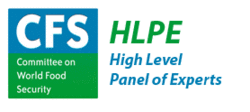Committee on World Food Security
High Level Panel of Experts on Food Security and Nutrition
Land tenure and international investments in agriculture
A report by the High Level Panel of Experts on Food Security and Nutrition
July 2011
High Level Panel of Experts on Food Security and Nutrition
Land tenure and international investments in agriculture
A report by the High Level Panel of Experts on Food Security and Nutrition
July 2011
HLPE Steering Committee members (July 2011)
MS Swaminathan (Chair)
Maryam Rahmanian (Vice-Chair)
Catherine Bertini
Tewolde Berhan Gebre Egziabher
Lawrence Haddad
Martin S. Kumar
Sheryl Lee Hendriks
Alain de Janvry
Renato Maluf
Mona Mehrez Aly
Carlos Perez del Castillo
Rudy Rabbinge
Huajun Tang
Igor Tikhonovich
Niracha Wongchinda
HLPE Project Team members
Camilla Toulmin (Team Leader)
Prem Bindraban
Saturnino Borras Jr
Esther Mwangi
Sergio Sauer
Context
The Committee on World Food Security (CFS) at its meeting of October 2010 requested the High Level Panel of Experts on Food Security and Nutrition (HLPE) to conduct a study on land tenure and international investments in agriculture and to present the findings at its next session in October 2011.
The study of the HLPE is to undertake analysis and formulate policy recommendations in the following three areas:
(i) the respective roles of large-scale plantations and of small-scale farming, including economic, social, gender and environmental impacts;
(ii) review of the existing tools allowing the mapping of available land; and
(iii) comparative analysis of tools to align large scale investments with country food security strategies.
Given the breadth of this topic, the study team chose to focus on large scale investment in land. We recognize that pressures on land stem from both domestic and international investment, and the two are often linked. However, the international dimension is particularly important because of the very
unequal access to resources which exists at global level. Land is becoming a global asset to be traded just like any other commodity. Yet land is different, since it provides a livelihood to more than 2 billion smallholders, many of whom are poor and food insecure. Land is also different due to the valuable environmental services it provides, and its strong social, and cultural attributes.
The last five years have witnessed growing investor interest in land and agriculture. While definitive statistics are hard to obtain, widely quoted figures assert that between 50 and 80 million hectares of land have been subject to negotiations by international investors, much of it in low income countries. It is generally agreed that more investment is needed in agriculture to address the needs of current and future generations. The report recognizes the diversity of experience between regions and countries, in terms of land availability, property rights, and public policy. But if such widely quoted figures are correct, there is good reason for concern about the impact of such land acquisitions on the food security of people in many of the countries hosting such investments. Can this large scale investment bring positive outcomes, or is it bound to damage the livelihoods of local people, and generate social and environment costs? Given the central role of government in managing and negotiating such inward investment, their role is key to setting the terms and conditions for ensuring a proper balance of interests between local land users and investors, and enforcing such contractual agreements. This report sets out recommendations for governments, international institutions and investors to address the serious concerns raised by this heightened interest in land acquisition.













